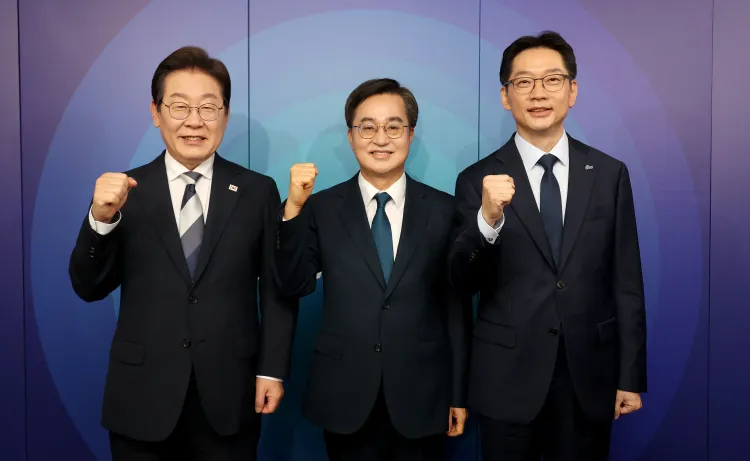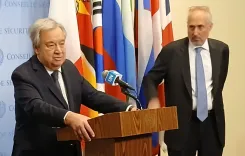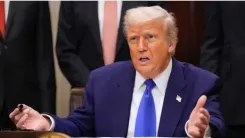South Korea: Ex-DP Chief Lee Maintains Strong Lead in Presidential Poll

Synopsis
Lee Jae-myung, the former leader of South Korea's Democratic Party, continues to hold a significant lead in approval ratings ahead of the presidential election scheduled for June 3, according to a new survey. The poll reveals crucial insights into voter sentiment and the political landscape in South Korea.
Key Takeaways
- Lee Jae-myung leads with 41% in the NBS poll.
- PPP candidates follow with 10% and 8% approval.
- 39% prefer the PPP to retain power; 50% want a regime change.
- The election is set for June 3, following Yoon Suk Yeol's impeachment.
- Presidential candidates must register by May 11.
Seoul, April 24 (NationPress) Lee Jae-myung, the former head of South Korea's Democratic Party, has retained a substantial lead in approval ratings among candidates for the upcoming presidential election on June 3, according to a recent survey released on Thursday.
The National Barometer Survey (NBS) revealed that Lee secured 41 percent of the poll, marking the first instance where his figures exceeded the 40 percent threshold in an NBS survey.
Following him were former Daegu Mayor Hong Joon-pyo and ex-Labor Minister Kim Moon-soo from the conservative People Power Party (PPP), each garnering 10 percent, while former PPP leader Han Dong-hoon received 8 percent.
The same survey indicated that 39 percent of participants supported the PPP continuing in power, whereas 50 percent favored a change in leadership.
Notably, South Korean Acting President and Prime Minister Han Duck-soo was omitted from the survey amid rising speculation about his potential candidacy, according to Yonhap news agency.
The South Korean government has set June 3 as the date for the next presidential election following the removal of former President Yoon Suk Yeol.
This decision was made during a Cabinet meeting four days after the Constitutional Court upheld the impeachment of Yoon due to his brief imposition of martial law in December.
Under constitutional guidelines, a new election must occur within 60 days after a presidential vacancy arises.
The government has also declared June 3 as a temporary public holiday.
Subsequently, the National Election Commission commenced early candidate registration shortly after the Constitutional Court dismissed Yoon last Friday.
All candidates must register by May 11, with the official campaigning period beginning on May 12.
The law stipulates that any public servant seeking presidential office must resign at least 30 days prior to the election, which sets the deadline at May 4.
The newly elected President will take office immediately following the election without a transition team, as reported by Yonhap news agency.
This scenario parallels the early election held exactly 60 days after former President Park Geun-hye was dismissed on March 10, 2017, which took place on May 9.
In related news, Yoon, who made a dramatic rise from a top prosecutor to the presidency in approximately three years, became the nation's second President to be formally ousted from office, with his unexpected martial law attempt causing turmoil and intensifying political divisions.
With this ruling, Yoon, 64, follows in the footsteps of former President Park Geun-hye, who faced impeachment in 2017 due to a corruption scandal upheld by the Constitutional Court.
Prior to his presidency, Yoon commenced his career as a prosecutor in 1994 and ascended to lead an investigation into Park's corruption case, which ultimately resulted in her ousting and imprisonment.
In 2019, he was appointed the country's top prosecutor under then-President Moon Jae-in but experienced conflicts with the administration while overseeing inquiries into family members of former Justice Minister Cho Kuk.
Facing mounting pressure from the Moon administration, Yoon resigned in 2021, quickly entering politics and winning the presidential election in 2022 as the People Power Party's candidate.
Yoon's term was fraught with challenges, including an uncooperative National Assembly dominated by the main opposition, the Democratic Party, leading to him exercising his presidential veto against 25 bills passed by the Assembly.
Tensions with the Democratic Party peaked in early December when they introduced motions to impeach the country’s top auditor and a senior prosecutor, culminating in Yoon declaring martial law on December 3, which ultimately contributed to his downfall.








